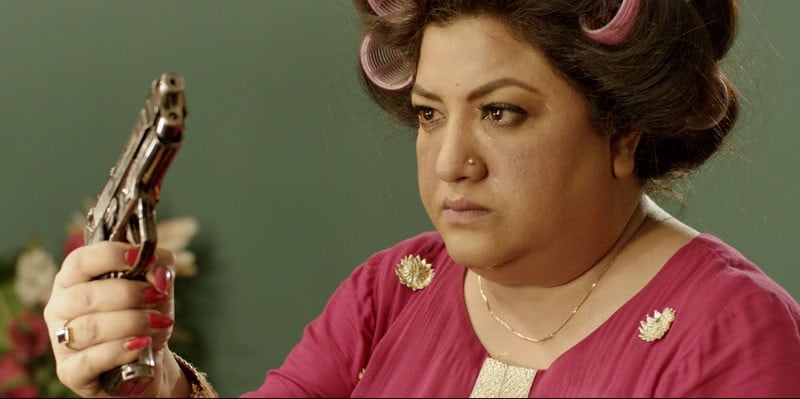
Meenu Gaur and Farjad Nabi talk about their latest film, Jeewan Hathi

Meenu Gaur and Farjad Nabi’s latest film, Jeewan Hathi, is set to release on November 4. The film is a black comedy based on the topsy-turvy universe of television in Pakistan
Unveiling the mystery behind the film’s curious name, which has been translated to ‘The elephant in the room’, Meenu says, "The tv is like the elephant in the room. We foolishly believe that we are in charge of our reality, and how we perceive it, but actually it’s the television set that is in charge. We are glued to it, we watch it, believe in it, get fooled by it, swear never to let it happen again and then start the cycle once more."
The film has already been screened in festivals in London, Canada, USA -- and the filmmakers say that people enjoyed it immensely.
The News on Sunday spoke to the directors about the film and what to expect from it. Excerpts of the conversation below:
The News on Sunday (TNS): Can you tell us a bit about what kind of statement the film will make about talk shows and television channels?
Farjad Nabi (FN): At the centre of the story is an ageing gameshow hostess in trouble. Her ratings have gone through the floor and she’s facing a huge personal crisis as a result. To regain her once powerful position she resorts to some Machiavellian methods to boost her ratings. Comedy and tragedy ensues.
Meenu Gaur (MG): The film has a satirical take on the world of television shows not just in Pakistan but the world over. But more than a judgement on these shows the film actually takes an empathetic view of the people who are trapped in this world like circus animals. That is also why the look and feel of the film is inspired by the ‘circus’. The story is contemporary but is put out in a stylised hyperreal way.
TNS: How long did you spend thinking about and directing this film?
MG: Farjad and I thought up the idea maybe five years ago but at that time it was just a one liner. Once we decided to make the film, the writing process took us roughly three months, the pre-production lasted another two months, and the principal shoot was wrapped in a record 11 days.
FN: Every film presents its unique set of challenges; fortunately we have a team that comes through for us each time. We have possibly set a record for the shortest shoot in the history of Pakistani cinema and that is all due to the fact that our actors worked so hard on rehearsals and the crew was so superlatively organised.
TNS: Can you tell us a bit about Hina Dilpazeer’s character?
FN: Hina Dilpazeer has a huge range of acting skills but very few people have seen her non-comic side. She brought a subtlety to the role which was extremely difficult to play. Similarly, the other main female character, Natasha, the gameshow hostess, is more than an evil, conniving vamp. She is very human.
MG: Yes, the film breaks stereotypes as it centres on women characters who take the narrative forward. Our filmmaking always has some kind of feminism running through it.
To have a middle-aged woman as a lead in the film is definitely not a norm! But also the stereotypical depiction of active women characters, in this case a media anchor, as manipulative, aggressive is overturned in the film, and the film actually looks empathetically at woman’s lives without turning them into sobbing victims.
TNS: This is your second time casting Naseeruddin Shah in a film. Is his role at all similar to the kind of work he did in Zinda Bhaag? Does the current India-Pakistan situation affect his role in the movie?
FN: It’s become a habit with us that we unconsciously write a role with him in mind. He has a very brief appearance in the film but it will be a memorable one. I think he has been extremely supportive of emerging cinema here, beyond our films. Cutting edge films, like Khuda kay liye by Shoaib Mansoor have had close collaborations with him. I think if you’re a filmmaker in South Asia to work with him would definitely be on your wishlist.
As far as the India-Pakistan is concerned all I can say is that the success of Actor in Law with Om Puri says a lot about the positive attitude of our audiences. Good art transcends storms in teacups.
MG: He is without doubt our guru and has stood by us. We owe him a lot. He is also extremely critical and when deserving, full of praise.
TNS: For you, what was the most memorable part of making this film?
MG: I got to cast my girlfriends Samiya Mumtaz and Nimra Bucha as fun, crazy women and, of course, Hina Dilpazeer as the Queen Bee. So, this film has been a feast as far as whacko female characters go.
FN: We had a lot of fun with Hina Dilpazeer. She was up for anything that gave us a lot of freedom in developing her role. So, imagine, a morning show hostess, dressed up as a quasi-bride, and a Punjabi film heroine!